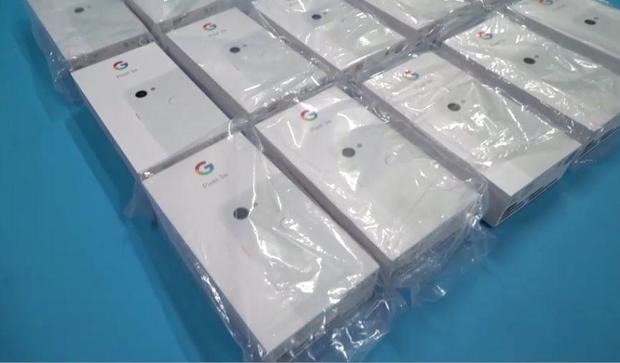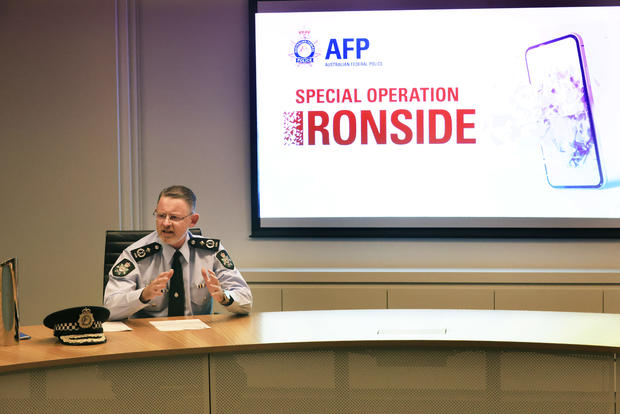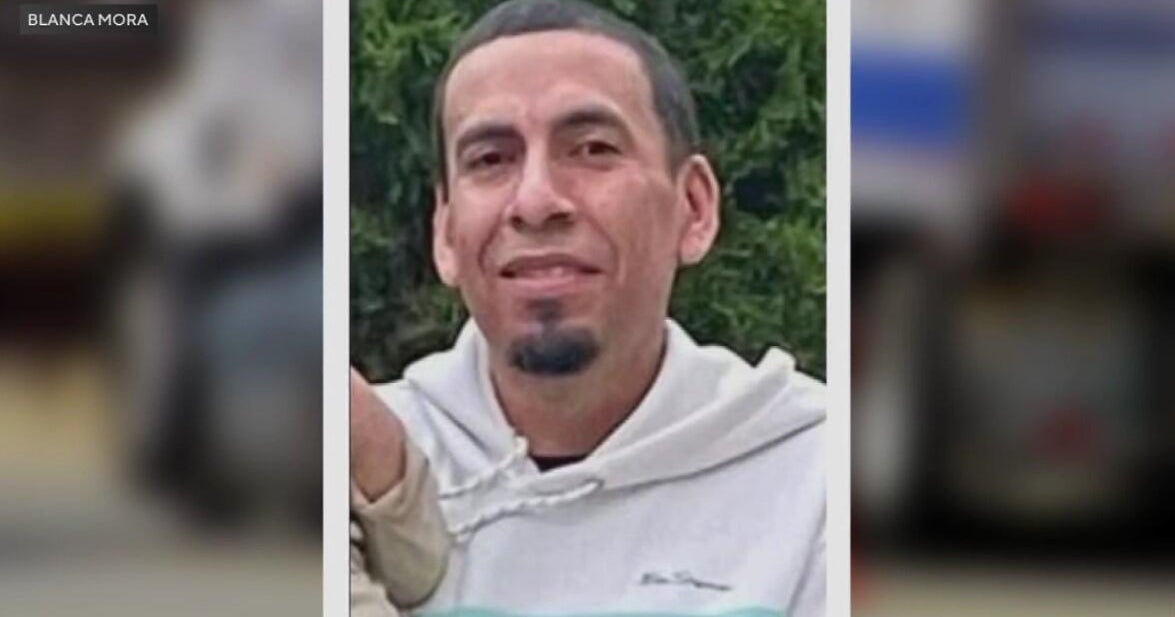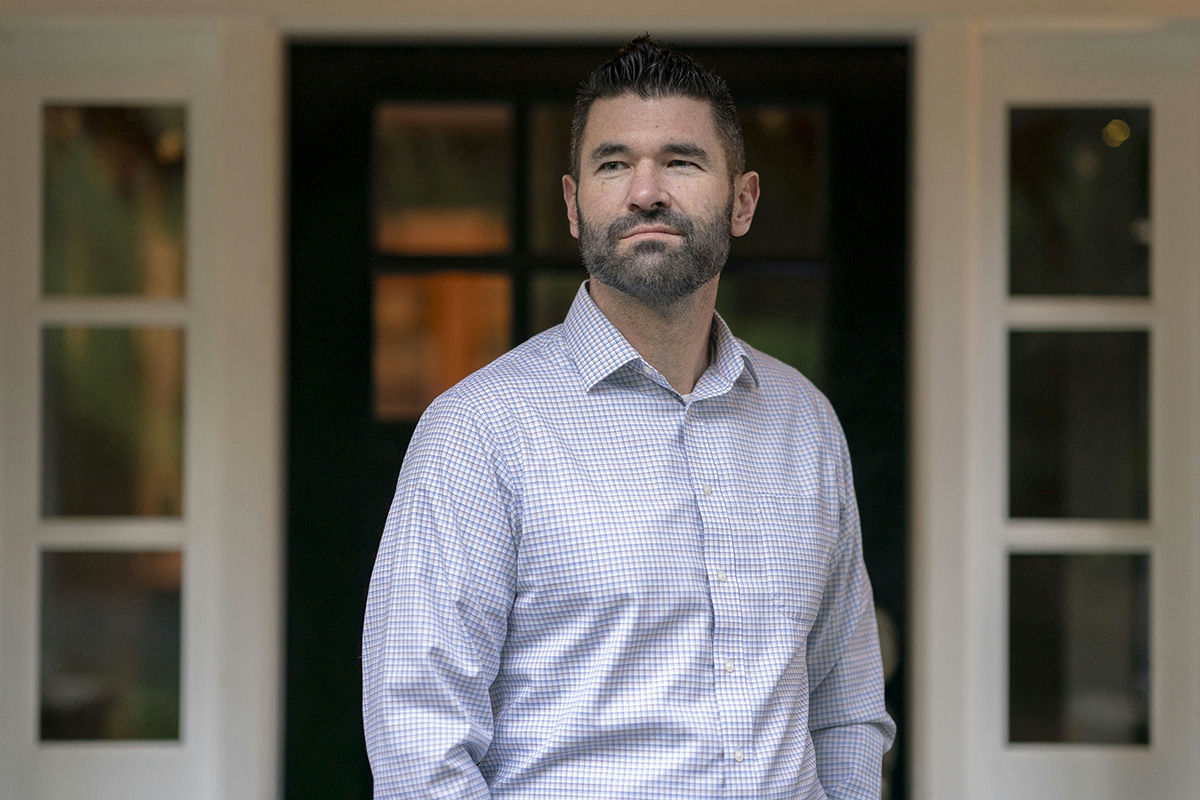"Heavy blow against organized crime" after criminal "kingmakers" tricked into using FBI-run messaging app
Authorities in Australia, New Zealand, the U.S. and Europe said Tuesday that they've dealt a huge blow to organized crime after hundreds of criminals were tricked into using a messaging app that was being secretly run by the FBI. Police said criminal gangs thought the encrypted app called ANOM was safe from snooping when, in fact, authorities for months had been monitoring millions of messages about drug smuggling, money laundering and even planned killings.
The app was part of a worldwide sting called operation Trojan Shield, which was led by the FBI and involved the U.S. Drug Enforcement Administration, the European Union police agency Europol and law enforcement agencies in more than a dozen countries. Europol said police from a total of 16 countries had carried out raids sparked by evidence from the FBI-monitored smart phones.
About 9,000 officers have been deployed worldwide to make arrests and search more than 700 locations over the past 48 hours, according to the FBI and the U.S. Attorney's Office for the Southern District of California. More than 32 tons of drugs — including cocaine, cannabis, amphetamines and methamphetamines — were seized along with 250 firearms and $48 million in various worldwide currencies, the FBI said. More than 50 clandestine drug labs have been dismantled — including one of the largest clandestine labs in German history — and 800 people have been arrested in total, including 500 in the last 48 hours, according to U.S. officials.
"The results are staggering," FBI Assistant Director Calvin Shivers said Tuesday morning at Europol's headquarters in The Netherlands.
The U.S. Attorney's Office for the Southern District of California unsealed an indictment Tuesday, charging 17 foreign defendants who administered or distributed the devices with racketeering counts. Eight of the defendants were taken into custody Monday night, and the other nine are considered fugitives, officials said.
"Operation Trojan Shield was an innovative approach to an ongoing, evolving and complex problem law enforcement continues to face every day — how to infiltrate closed encrypted communication devices utilized solely and exclusively for criminal activity," said Suzanne Turner, special agent in charge of the FBI's San Diego Field Office.
Turner said criminals often use encryption to communicate under a "cloak of secrecy," inhibiting law enforcement's ability to detect crime before it happens. She said the investigative team sought to exploit criminal enterprises' need for closed encrypted devices, which she called a "significant vulnerability" for the criminals.
The FBI said they provided more than 300 criminal syndicates in more than 100 different countries with about 12,000 devices. The French news agency AFP quoted Shivers as saying the devices containing the ANOM app were distributed over almost two years, allowing agents to "monitor their communications."
"ANOM's distributors, administrators and agents had so much confidence in the secrecy of their devices that they openly marketed them to other potential users as designed by criminals for criminals," said Randy Grossman, the acting U.S. Attorney for the Southern District of California. "But the devices were actually operated by the FBI."
Authorities in Australia said the app was installed on stripped-back mobile phones and its popularity grew organically in criminal circles after it was vouched for by some high-profile underworld figures, described as "criminal influencers." Reuters reports the gangs believed the system was secure because the phones did not have any other capabilities such as voice or camera functions, and the app was encrypted. Australian Federal Police Commissioner Reece Kershaw said the communications were brazen with no attempt to hide criminal plots using code words, according to the news agency.
"We have been in the back pockets of organized crime," Kershaw said. "All they talk about is drugs, violence, hits on each other, innocent people who are going to be murdered."
Australian authorities said they arrested 224 people and seized more than four tons of drugs and $35 million in an ongoing operation that dates back three years. New Zealand police said they had arrested 35 people and seized drugs and assets worth millions of dollars.
Australian Prime Minister Scott Morrison told reporters it was a watershed moment that would keep the nation's communities safer.
"Today, the Australian government, as part of a global operation, has struck a heavy blow against organized crime," Morrison said. "Not just in this country, but one that will echo around organized crime around the world."
Australian Federal Police Commissioner Reece Kershaw said the sting, called Operation Ironside in Australia, was borne from a longstanding partnership between his agency and the FBI. He said they had shut down six clandestine laboratories and stopped 21 death threats, including saving a family of five.
"We have arrested the alleged kingmakers behind these crimes, prevented mass shootings in suburbs and frustrated serious and organized crime by seizing their ill-gotten wealth," Kershaw said.
Det. Superintendent Greg Williams, who leads a New Zealand police group fighting organized crime, said the sting was conceived in 2018 after the FBI took down a previous secure app favored by criminals, Phantom Secure.
Williams said that left a void in the market that authorities helped fill with the ANOM app.
"We just can't speak highly enough of the FBI and the work they have done in the background here," Williams said.
He said New Zealand was a small country and relied on the intelligence-gathering capabilities of its Five Eyes partners, which include the U.S., Australia, Canada and Britain.
Swedish police prevented a dozen planned killings and believe that they have arrested several "leading actors in criminal networks," according to a statement from Linda Staaf, the head of Sweden's national criminal intelligence unit.
Finnish police said Tuesday that nearly 100 people have been detained and more than 500 kilograms of drugs confiscated, along with dozens of guns and cash worth hundreds of thousands of dollars.
German authorities said on Tuesday that police had arrested more than 70 suspects and searched scores of sites as part of the global crackdown. The raids carried out on Monday were largely in the state of Hesse, according to the Frankfurt public prosecutors office.
The Reuters news agency quoted the prosecutors office as saying police seized hundreds of pounds of narcotics, more than 20 weapons, dozens of luxury vehicles and more than $250,000 worth of cash, as well as IT equipment.
In March, Belgian police arrested dozens of people after cracking another encrypted chat system and seizing more than 17 tons of cocaine.
The latest operation went even further.
"The success of Operation Trojan Shield is a result of tremendous innovation, dedication and unprecedented international collaboration," Shivers said.
Clare Hymes contributed to this report.






